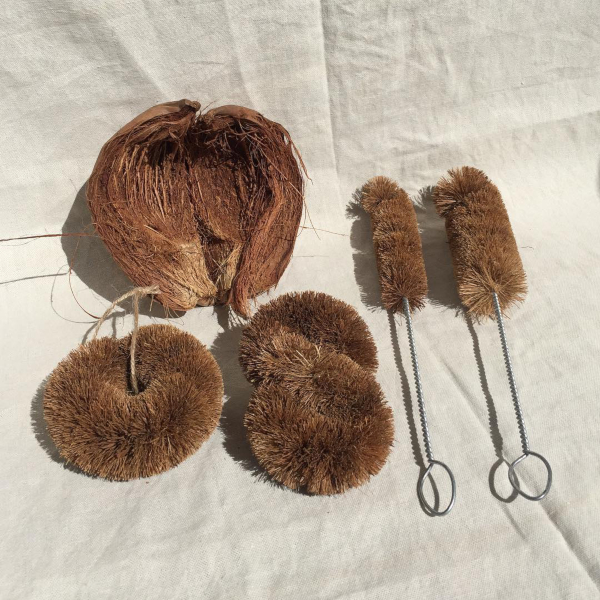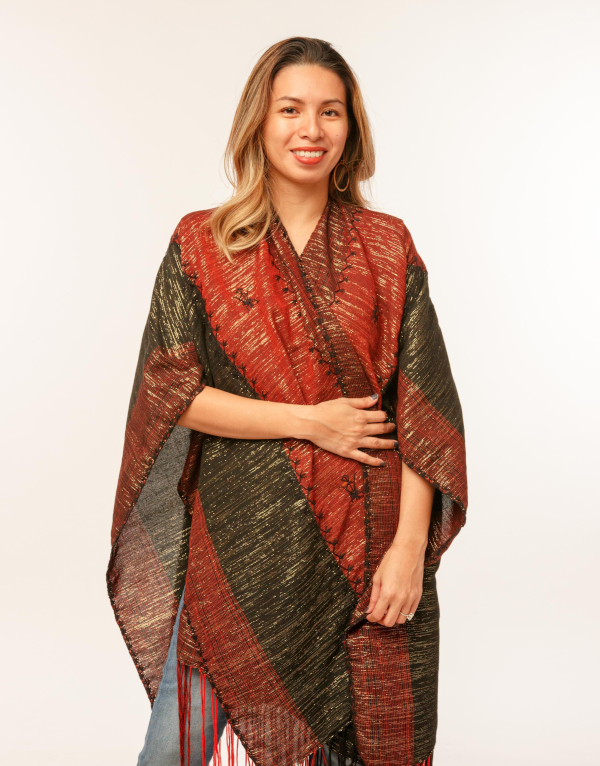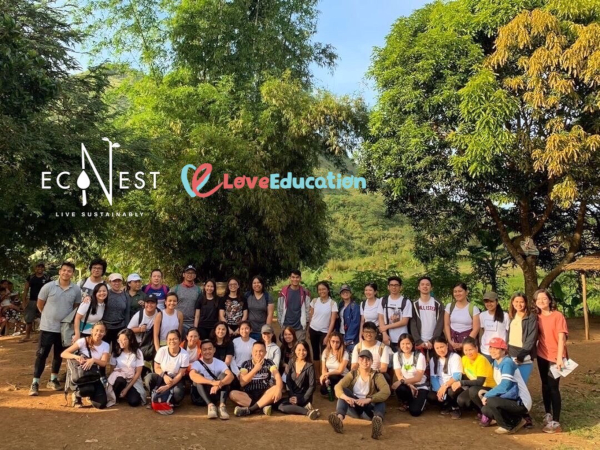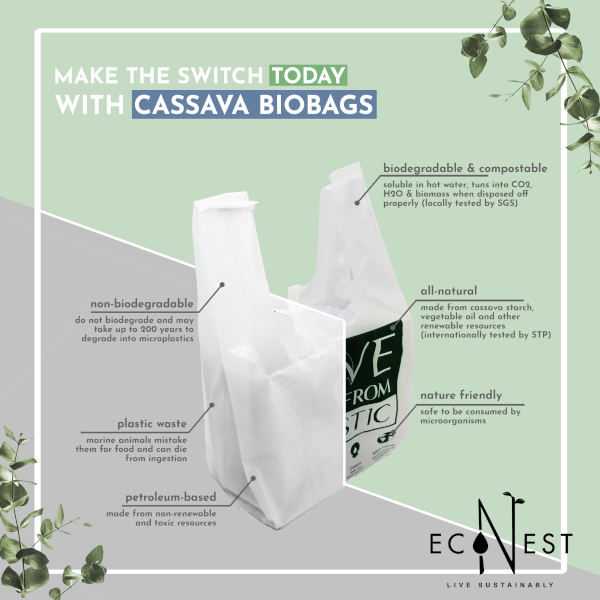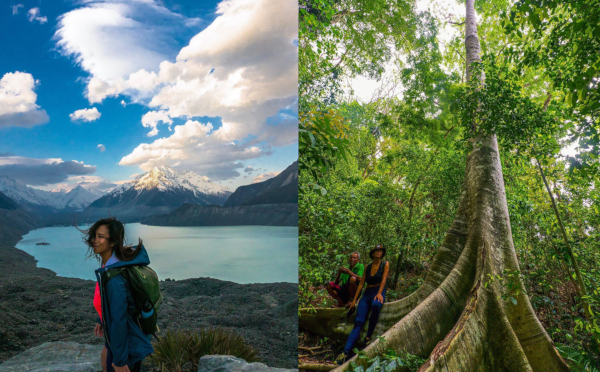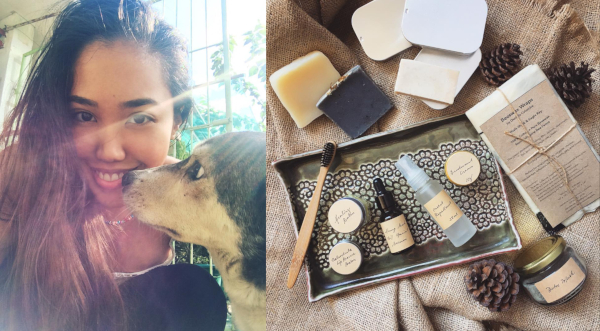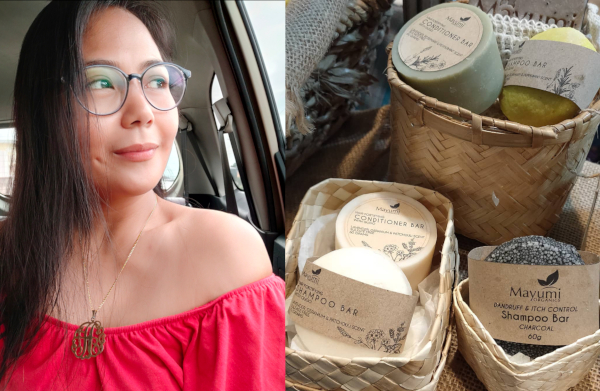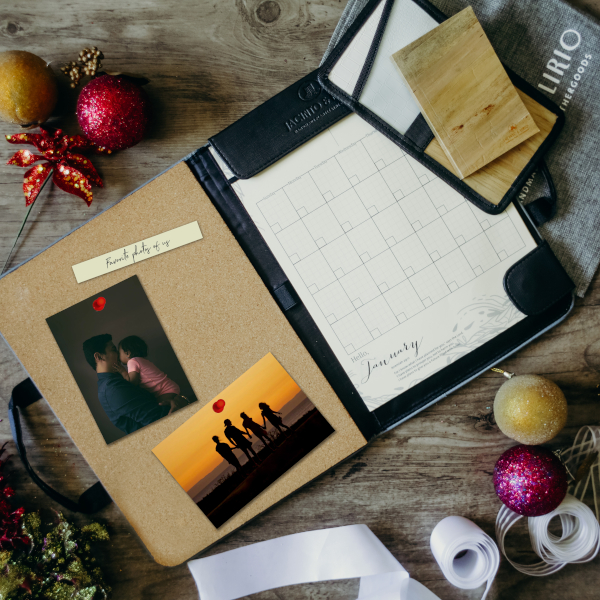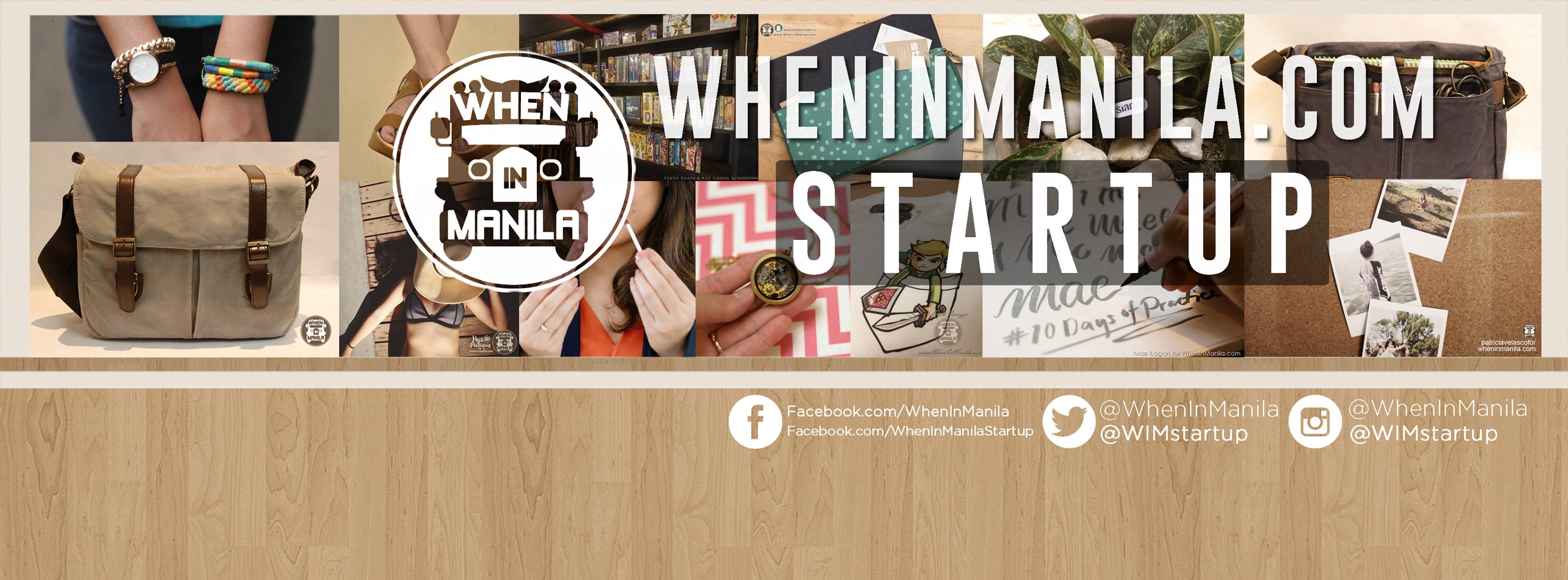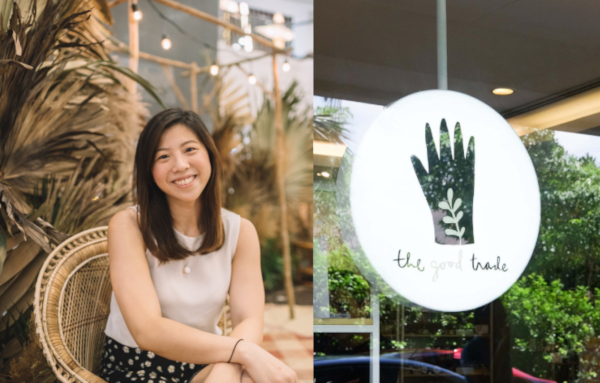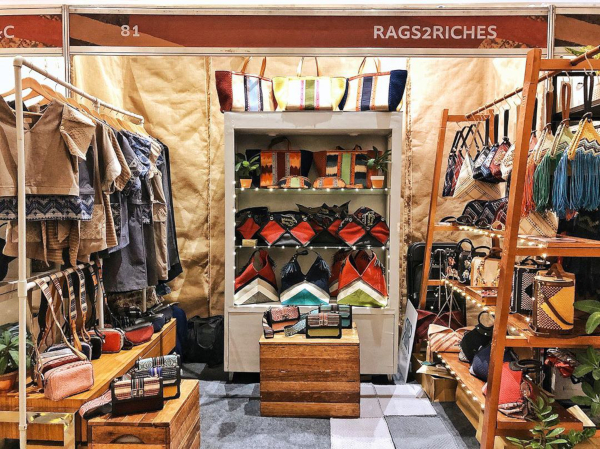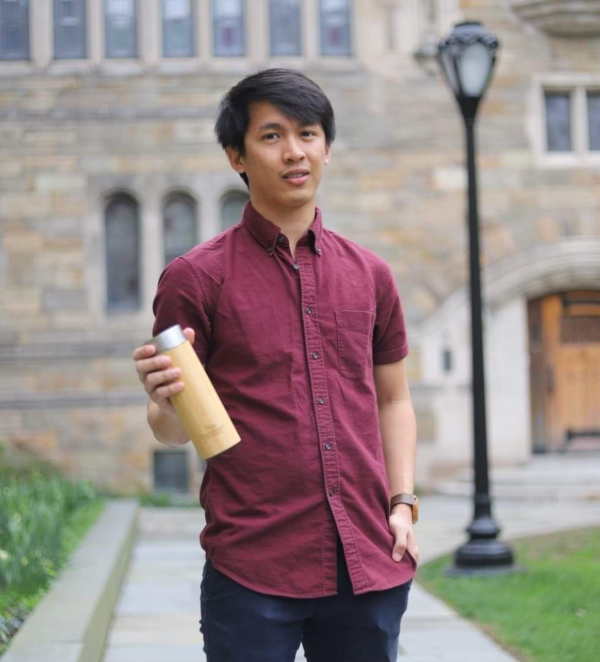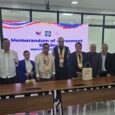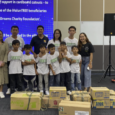10. Genevieve Inumerable, 36, @ecoswitchshop
Eco Switch Shop
What’s your advocacy and its significance? I’m a farmers’ right/labor rights and peasant advocate. at the same time, I also try to help raise eco-awareness by giving sustainable options which are locally sourced and crafted coco coir brushes. Because in reality, we can’t address climate justice without giving proper wages and support to our workers. People put blame on our peasant communities for being the most trash contributor but that’s actually a class issue. These communities can’t afford to buy in bulk because again, they’re not given proper wages and they have other more important concerns than their plastic consumption. And It’s the multi-million companies who are actually responsible for the trash we’re all consuming as they won’t care enough to give eco options with their packaging.
What do you hope to accomplish? To continually raise awareness not only on climate issues and how important it is to support indigenous products but to delve deeper and also tackle labor rights and farmers’ plight until it’s properly addressed by the system.
What are the challenges you are facing? Fairtrade may result in a higher price range. Which means that a certain class bracket can only afford your items. This is why efforts have to be made by using our own resources to reach out to those fighting other causes.
How can we, as Filipino consumers, realistically adopt a lifestyle that is more sustainable and less wasteful? By making our own food from scratch, buying from the public market to get away from excess packagings and bringing our own bayong or reusable bags and container to reduce plastic consumption. And if possible, planting or farming, eating more plant-based and composting. And planning well to lessen food waste.
9. Adrienne Charuel, 34, @maison.metisse
Maison Métisse
What’s your advocacy and its significance? My advocacy as an eco-social entrepreneur is: celebrate universal cultural heritage with Filipino traditions and craftsmanship through a contemporary line of clothing, accessories, jewelry, and decor; promote ethical fashion and lifestyle not only through our methods and resources but as well as collaborations with local communities to preserve their traditions and improve their livelihoods; and inspire others to have more sustainable and ethical business models.
Through our advocacy and creative vision, we also strive to eliminate poverty by empowering children. By practicing fair trade, we are able to provide income and opportunities to their parents and individuals giving them, their family, and children a better chance at life.
What do you hope to accomplish? We hope to preserve cultural heritage, encourage community, help the environment, and eliminate poverty. We also hope that we get to show the importance of instilling values as a sustainable business and social enterprise.
What are the challenges you are facing? We believe that the challenges we are facing are due to education of values and lack of values.
There is a huge lack of fair trade practice. From the makers, to the designers, to the customers. There is a huge imbalance. It seems that people just want things to be cheap, everyone is so used to fast fashion just like junk food. They care more about how much they can save than the true value of what they are buying. It’s really important to be aware of who made the product, how is it made, and what it is made of.
There is also a lack of community and respect. From the makers, to the designers, to customers, Respect for original designs, honest communication, transparency, giving due credit to local communities etc. If we all work together in harmony instead of against each other. The opportunities will be bigger and better and we all uplift each other.
How can we, as Filipino consumers, realistically adopt a lifestyle that is more sustainable and less wasteful? I think again it goes back to values. Because, if its truly important to you, to who you are and want to be, it’s easier to make the change. Always start with baby steps. Be kinder, Get to know your local communities and business as well as local artists and designers. Get to know their advocacies and how you can support them. You can also start at home simply by getting to know how much plastic or paper you waste, how much electricity you use. and go from there. It’s best to start with an awareness of how much waste (from water wastage to time wasted on being angry at someone) we have in our lives and slowly eliminate from there. Remember its not just the environment but also our treatment of people.
8. Dominique Sevilla, 30, @econestph
EcoNest PH
What’s your advocacy and its significance? We would like to create a community of environmentally conscientious individuals and business owners who take action in addressing our current environmental issues by making use of the company’s three brand pillars which are PREVENT — by switching to truly biodegradable & compostable packaging materials being offered by EcoNest Ph instead of still using petroleum-based plastic packaging, CURE — by participating in both community or company-initiated activities such as tree-planting, turtle-hatching, coastal cleanup etc. to create awareness and help resolve our on-going problems, and lastly, SUSTAIN — by educating more people about the available alternatives, its benefits and the importance of leading a sustainable business.
We are launching the EcoNest Ph Sustainability Alliance in 2020 to encourage local & international businesses & individuals to share their best practices in running environmentally conscientious enterprises or households highlighting the theme of “Get Waste Educated”.
What do you hope to accomplish? We hope that we as Filipinos will be able to unite and raise our standards in how we run enterprises as we preserve and protect Mother Nature by supporting local companies such as ours who advocate about the holistic approach in lessening plastic footprint. EcoNest Philippines envisions to become a key player in the packaging industry in Asia while ensuring that respect for Mother Nature is at the core of our business.
What are the challenges you are facing? There is still a huge number of companies and individuals who focus solely on the cost-impact of using eco-friendly packaging materials without considering the negative environmental impact and non-value added costs of retaining the use of petroleum-based, single-use plastic items.
Our price points for cassava biobags are close to non-woven “eco cloth bags” made from polypropylene — a type of plastic that looks like fabric that does not biodegrade and yet considered more acceptable because of misinformation.
How can we, as Filipino consumers, realistically adopt a lifestyle that is more sustainable and less wasteful? We encounter comments that living a sustainable lifestyle is expensive, but in reality, it is imperative to understand that sustainability actually starts from within, from having the mindset that each of us has a part in protecting and preserving the earth for generations to come. The first step is to educate yourself about the realities that our environment is facing then just in your own kitchen, get a pair of spoon & fork, wrap it in a tissue and tuck it in your bag so the next time you buy something for takeout, you won’t have to use plastic cutleries again. This is one simple way of being less wasteful while having sustainability already in mind.
7. Nella Lomotan, 30, @ecoexplorations
Eco Explorations
What’s your advocacy and its significance? During my 20’s after I graduated from college, I loved exploring our country particularly through climbing mountains and visiting our different islands. I felt like I was somehow boxed in my own bubble in the big city growing up and exploring made me realize how much we had and how blessed we are as a country with our natural resources.
Along the way, my experience in and of nature grew deeper. Because I saw that while we are blessed, our natural resources have been depleted and are threatened — deforestation, much endemic wildlife endangered, and, as an archipelago, our marine and coastal ecosystems damaged. Seeing and experiencing these things through traveling, I realized that it was not enough to travel and appreciate what we have; but we needed to take action to be part of the solutions.
This is how Eco Explorations was born. Our mission is to conserve our natural heritage and biodiversity and to provide socio-economic impact for the communities we work with through sustainable tourism. When you talk about sustainable tourism, it’s tourism that takes into full account environmental, socioeconomic and cultural aspects of the places and communities and ensures that tourism contributes rather than degrades each of this.
What do you hope to accomplish? Our advocacies which people can take part of through our eco-tours and events involve forest restoration, wildlife conservation, ranger support, livelihood development, provision of solar energy and clean water to communities without access to them.
I do believe the time is now to look at the way we travel and live differently and to each have a shift in our own lifestyles. We each can make a contribution and this is what we hope to impart to Eco Explorers all over the Philippines — that they can be a part of our mission.
We hope to create more opportunities and experiences all over the Philippines for sustainable tourism to contribute to conservation and community impact.
What are the challenges you are facing? Many of our projects and ecotours take months to develop because of their nature and because of the involvement of community partners. We always have to look at many sides and assess the impact and what we aim to achieve. Thus this takes up resources- human, financial, and the biggest — time. But we are not a regular travel company and we do what it takes to get to our goals even if it takes time. It is worthwhile.
How can we, as Filipino consumers, realistically adopt a lifestyle that is more sustainable and less wasteful? I think it’s as simple as being more conscious of what you choose. Not just with products but also experiences.
Do I really need this item and can it span years of use, can it be recycled or repurposed somehow? Do I need to keep buying clothes I just use once? Do I go on this tour that has practices where we create a negative impact on wildlife and the environment? Do I really need that much water to shower, how can I save? Do I need to order this much food which I end up not eating? Do I really need this plastic straw?
Small questions and prompts among ourselves lead to actions that when collectively taken are big.
6. Daniela Calumba, @danielacalumba
What’s your advocacy and its significance? One of the things I am passionate about affecting through this venture is slowing things right down. I’ve been continuing my studies on permaculture and plant medicine, developing a food forest, and trying to raise more awareness on the importance of these. My work has always been more than just shampoo bars and beeswax wraps, more than natural ingredients and biodegradable packaging. I think it starts with the farmer. With the plant, the seed, the soil. I wanted to work directly with our local farmers, support their work, support the land, and continue developing my own farm. Truly seed to bottle, which is why I always emphasized the word “slow.” I veered away from labeling my work “zero waste”, “organic”, “eco-friendly”, and such. These are buzzwords that have been so overused. I wanted to go beyond them.
I have always wanted this slow philosophy of life and permaculture passion to catch on. I want more mainstream circles to appreciate and see the value in them. Small scale farm sourcing and permaculture are heart-centered and benefit real people and communities. When you use a product like mine that is sourced on a small local scale, you are now connected to and supporting dozens of small farmers who have immense love in their work. I want consumers, brands, corporate entities, and the media to begin to see the value this type of sourcing offers our planet and humanity.
What do you hope to accomplish? My goals on the land are to build community and quality of life for all. The vision includes growing a diverse and abundant food forest that includes edible and medicinal plants, organic fruiting shrubs and trees, and vegetables. To benefit our planet on a micro and community level, to support the Filipino superhumans who farm ethically and responsibly against all odds. I always ask myself, What else can I make with my hands? What can I build that’s more lasting and meaningful? How do I share my knowledge and work? How do I help and educate more people besides those that buy my products? I hope to continue providing more information regarding caring for the earth’s ecosystems, permaculture, and medicinal plants. The land is wide and welcoming. The potential is huge. When we join forces with nature’s brilliance, there is truly hope for our collective well-being.
What are the challenges you are facing? I’ve noticed a tendency today, which is most likely a result of the intense and obsessive social media culture we’re living in, that it’s much more about how you’re communicating than what you’re actually doing. It no longer really matters what’s behind your words and pictures as long as they look sustainable. One of the biggest challenges I’m facing is communicating the work that I do and getting through with it. So many people say that they are doing the work, but very few people are actually doing it.
Consumers are becoming increasingly aware of misleading marketing languages and I hope more consumers are being cautious when hearing words like “natural”, “eco”, and “organic”. There are movements to reclaim words, to fight against greenwashing, to increase transparency and honesty and I 100% support those movements. Something we see more and more are claims about sustainability. There are many brands and businesses on social media saying that they are so sustainable and posting beautifully curated photos to go with it. But what do they even mean?? The more this happens, the more it starts to discredit what we are trying to do. It seems like we need to find new words because “sustainable” and “sustainability” are going to be washed out and are just becoming advertising strategies. I would love to find words that better speak to my work so that we don’t have to use terms that are becoming meaningless. Communication is massive and to be honest, I haven’t figured it out completely yet.
How can we, as Filipino consumers, realistically adopt a lifestyle that is more sustainable and less wasteful? Whatever you choose to do to become more responsible, choose one thing first and do it well. Master it first, and then move on to the next. We are constantly bombarded by social media to do this and buy that in order to live a more “sustainable” life. But if you try to do too many things at once, then you will be doing everything with a 75% focus. That will only get you overwhelmed, frustrated, and make you want to give up. So decide on your first focus, research extensively, and really make an effort. Once you lock that first thing down and get a kind of system in place for whatever it is, then you become comfortable with it, become proud of it, and it will incorporate itself into your everyday life – and then you can move on to the next. Becoming a conscious and critical consumer takes a lot of effort, but I feel that if you start slow, you get into the rhythm of it better, and it will gradually become second nature.
5. Angelica U. Chongco, 39, @mayumiorganics
Mayumi Organics
What’s your advocacy and its significance? I am a cosmetic formulator and I develop zero waste, eco-friendly personal care products like shampoo bars, conditioner bars, deo bars, and handcrafted soaps. Mayumi Organics aims to help minimize plastic waste in the environment.
What do you hope to accomplish? I am hoping that by providing zero waste personal care, we can help normalize using these alternatives and make people fully realize the importance and necessity to be conscious of our environment for the survival of the next generations.
What are the challenges you are facing? Businesswise, it is challenging to put up a business such as ours, as we had to create our own systems in place. Since last year up to today, we are still facing a lot of growing pains — however, I am not complaining, after all, this is for our environment; this is for the future of the children.
Another challenge is to be able to create cheaper formulas to appeal to the masses, where I think we would have more impact. I really hope to be able to cater, satisfy and provide alternatives to our “tingi” culture.
How can we, as Filipino consumers, realistically adopt a lifestyle that is more sustainable and less wasteful? If we effectively voice out our biggest why, I don’t think we will have a problem adapting to the lifestyle. I’m glad that there are a lot of active organizations and individuals raising awareness to.make the switch to zero waste or at least, lessen their carbon footprint.
4. Anne Krystle Yee, 31, @jacintoandlirio
Jacinto and Lirio
What’s your advocacy and its significance? Jacinto & Lirio provides beautifully handcrafted plant leathergoods which are impressively multi-functional yet stylish conversational-pieces with a lifestyle appeal for professionals, and companies who want to create a strong patriotic, environmental and socio-ethical statement. We make INDIGENOUS LOOK SEXY.
What do you hope to accomplish? JACINTO & LIRIO (meaning “Hyacinth” and “Lily”), is a social enterprise that transforms a “pest” into eco-iconic and multi-functional leathergoods sustainably made from water hyacinth, with a mission to empower affected families by the water hyacinth infestation problem through livelihood generation.
It is a brand that stands for “Stylishness, Sustainability, and Empowerment.”
The water hyacinth is the most damaging aquatic plant worldwide because of its capability to reproduce at an extraordinary rate. It grows up to 2 meters wide which reduce light and oxygen, change water chemistry, affect local flora and fauna This is a vivid representation of water hyacinth communities in the Philippines, communities whose fishing livelihood has been hampered due to marine transportation and irrigation problems; Communities where fish kills are rampant; Communities who has experienced the need to evacuate due to high flood levels reaching as high as 6 feet deep, because the water hyacinth has clogged up the waterway; Communities who experience high rates of water-borne diseases like malaria or dengue; Communities where children are forced out of school. Who would have thought that this simple aquatic plant would cause such detriment in these communities?
Through the creation of well-designed, functional and Philippine-inspired plant leathergoods, Jacinto&Lirio aims to improve the lives of people from both ends of the spectrum — the water hyacinth communities who are empowered through meaningful work, and the people purchasing who are enriched by the eco-friendly products. We aim to work within a collaborative business model for the purpose stated in the mission — social impact in livelihood, environmental protection, and product innovation.
How can we, as Filipino consumers, realistically adopt a lifestyle that is more sustainable and less wasteful? There are plenty of ways to make one’s lifestyle less wasteful but it takes more effort to make it sustainable, to make it one’s way of life. More than riding the ‘beach clean-up’ and ‘tree-planting’ wave of trending events, one should also make time to consciously assess his or her daily activities — food consumption, mode of traveling, grocery purchases, energy use at home and at work — and how it affects the environment.
Start adapting to an eco-friendly lifestyle and see how much you can integrate it into your daily life. An example would be patronizing products of companies that have biodegradable packaging, or entrepreneurs that make items that are eco-friendly. Go for appliances that are energy-efficient such as inverters in refrigerators. Walk if you can, or use a bicycle to reduce your carbon footprint.
Very few assess the garbage they accumulate at the end of the day. It will actually give us a clear idea of how much biodegradable or non-biodegradable items we buy or consume.
It might seem daunting at first, but big changes always start with small steps.
In case you didn’t know, we have a page dedicated to all things business. Check it out here!
3. Jana Bunagan, 24, @thegoodtrade.ph
The Good Trade
What’s your advocacy and its significance? In The Good Trade, we believe that can live a life that’s good and does good. We gather purpose-driven brands and NGOs so that consumers can shop ethically and sustainably without fuss. More than just buying and selling, The Good Trade encourages fairgoers to create a culture of reuse and repair as well as pay it forward in our community. We have a repair station for those items you cherish and a donation/recycling station for those that need a new home.
What do you hope to accomplish? Hopefully one day, embracing an ethical-eco ethos becomes a standard rather than as an add on. For this to happen, consumers have to be immersed in the story instead of just buying products. The Good Trade PH aims to fill the gap in storytelling on top of encouraging them to close the loop through repairing, recycling, or donating existing items. At the end of the day, people have to become more aware if we want to be sustainable. At the end of the day, it has to be a movement.
What are the challenges you are facing? At The Good Trade, we’re working with the current system (capitalism) to encourage mindfulness. As much as we want to change that overnight, things don’t work that way, just like our individual zero waste journeys. We take small steps, we all do our best to make the world a little better.
This ideal is something we gradually work on. This is a community, and we don’t live independently from the current issues that press our society. We still very much believe that The Good Trade fosters an environment geared towards positive change. And while we are limited with what we have, we know that there is much opportunity to grow here, as long as we take these small steps together.
How can we, as Filipino consumers, realistically adopt a lifestyle that is more sustainable and less wasteful? Reframe your perspective that zero-waste is all or nothing. Every small step has a big impact. For some people, this may mean using a metal straw on a plastic cup, for some, it means choosing vegan alternatives or maybe supporting a cause close to their heart.
With that said, zero-waste and/or sustainability doesn’t have to perfect or look a certain way. There isn’t a one size fits all formula. Do your own thing and celebrate your small wins!
2. Reese Fernandez-Ruiz, 34, @reesefernandez / @rags2richesinc
Rags2Riches
What’s your advocacy and its significance? Our advocacy is intentional living. We are a fashion and design house empowering community artisans, but the underlying philosophy of what we do is intentionality. We believe that our every decision (especially purchasing decision) have consequences beyond what we can see. Our decisions can destroy, but they can also empower.
What do you hope to accomplish? We started R2R because we wanted to create an inclusive company that is a life and livelihood partner of artisans from poor communities from around the country. We want to fulfill this while creating meaningful and intentional products that make use of the waste of the fashion industry. Because of our end-to-end intentional and inclusive supply chain, our hope is to be able to create a lasting positive impact on the lives of our artisans, save what we can from the waste of the fashion industry, and be an example of how businesses can do well by doing good. We hope that our impact goes beyond our company, but influences and encourages other companies to adopt sustainable and impact-creating practices.
What are the challenges you are facing? There are so many and we have been through so many throughout the years as well. We go through regular business challenges of increasing sales, controlling costs (while maintaining fair wages for artisans as a non-negotiable), managing cash flow, and the like. But aside from the regular business challenges, we also go experience challenges that are unique to intentionally impact-creating enterprises. We question and continuously work on the systems we establish that could empower or disempower, the distribution of wealth and power within the company, and our enduring determination to build our company as an inclusive and empowering partner for our artisans.
How can we, as Filipino consumers, realistically adopt a lifestyle that is more sustainable and less wasteful? It is tough! And to be completely honest, the most sustainable way is to not consume or buy new things. But we are talking about being realistic. While it is difficult to make completely ethical and sustainable lifestyle decisions (there are so many unintentional consequences!), we are better off trying than not trying at all. We should always try, try again, and try harder. We can start with small things while aiming for bigger things. We can influence others kindly while challenging institutions and industries to do better as well.
1. Jamico Jamlang, 25, @jamicocojam
The Bamboo Company
What’s your advocacy and its significance? My advocacy is to help protect the environment one step at a time through the use of bamboo as several global challenges are currently taking place, such as plastic pollution, global warming, and climate change.
What do you hope to accomplish? We hope to offer a sustainable and eco-friendly alternative to everyday plastic items through the use of bamboo and create a movement towards a more sustainable lifestyle.
What are the challenges you are facing? The challenges that we are facing is the resistance of the mindset of people towards a more sustainable lifestyle given that they don’t directly experience the effect of plastic pollution and climate change when in fact it negatively affects them in terms of the cost of common commodities such as rice and fish which are directly being affected by environmental issues.
How can we, as Filipino consumers, realistically adopt a lifestyle that is more sustainable and less wasteful? We can start in our home, to ensure that no food waste is generated, wastes are segregated, choice of food is sustainably obtained, and other simple acts of being eco-friendly.
Do you have a story for the WhenInManila.com Team? Email us at story.wheninmanila@gmail.com or send us a direct message at WhenInManila.com Facebook Page. Interact with the team and join the WhenInManila.com Community at WIM Squad!

